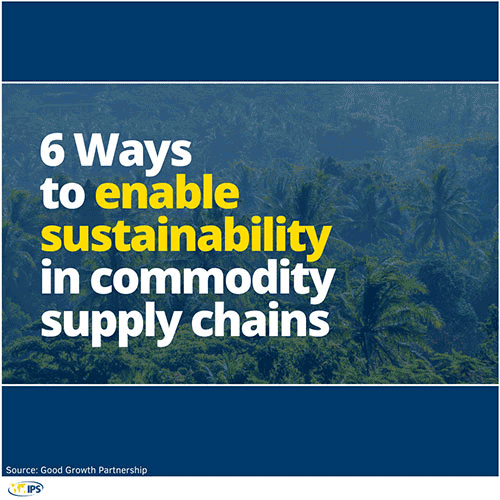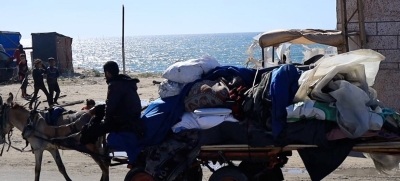JOHANNESBURG, Apr 27 (IPS) — Indonesia finds itself in a delicate balancing act of uplifting people from poverty, managing climate change and biodiversity, and satisfying an increasingly demanding international market for sustainable farming practices—and at the pivot of this complexity is the management of its palm oil sector.
As the UNDP-led Good Growth Partnership (GGP) joins a new World Bank-led project with similar objectives—the Food Systems, Land Use, and Restoration (FOLUR) Impact Programme, it acknowledges that the government of Indonesia has made considerable advancements in improving the sustainability of the industry and the value chain over the past five years with GGP support.
The GGP, using a multi-stakeholder approach, included several projects under one programmatic umbrella, linking production, demand, responsible sourcing, traceability, and transparency, with supporting financial institutions and investors in relation to reducing deforestation from land use change. The project aimed to connect all components of the supply chain—which, in the case of Indonesian palm oil, represents 4.5 percent of the country’s GDP and 60 percent of global exports.
Late in 2022, Trase, in its report From Risk Hotspots to Sustainability Sweet Spots, confirmed Indonesia had reversed its deforestation trends in 2018-2020; deforestation for palm oil was 45,285 hectares per year—only 18 percent of its peak in 2008-2012. The improvement is attributed to strengthened law enforcement, moratoria, certification of palm oil plantations, and implementation of corporate zero-deforestation commitments.
“Importantly, deforestation has fallen during a period of continued expansion of palm oil production. Although the decline in deforestation has been linked to a drop in the market value of crude palm oil, the recent spike in palm oil prices has not yet been accompanied by a boom in palm-driven deforestation—a cause for cautious optimism,” Robert Heilmayr and Jason Benedict commented on Trase’s website.
However, CDP Palm Oil Report 2022 notes that while companies are adopting a wider range of actions to end deforestation, these “actions are not yet robust enough to end commodity-driven deforestation in the palm oil value chain.”

CDP says while 86 percent of companies implemented no-deforestation policies, only 22 percent have public and comprehensive policies: “Traceability systems have been implemented by 87 percent of companies, but only 25 percent have the capacity to scale these to over 90 percent of their production/consumption back to at least the municipality or equivalent.”
One major challenge is the inclusion of smallholders in the supply chains—and while 44 percent of companies work with smallholders to reduce or remove forest degradation, less than a third support “good agricultural practices and provide financial or technical assistance to help them achieve this.”
It is precisely these challenges the GGP confronted in Indonesia.
“Systemic change in commodity supply chains is one of the essential transformations that must occur this decade to mitigate the combined threats of catastrophic climate change, biodiversity loss, and food insecurity and to achieve resilience for humanity globally,” GGP says in its assessment report, Reducing Deforestation from Commodity Supply Chains.
These deforestation commitments are not new and followed the New York Declaration on Forests (NYDF), adopted in 2014, which called for the end of forest loss and the restoration of 350 million hectares of degraded landscapes and forestlands by 2030. Then came the Paris Climate Agreement, which in terms of its Reducing Emissions from Deforestation and Forest Degradation (REDD+) agreements, was crucial for reducing emissions from deforestation and degradation in developing countries. More commitments flowed after the 2015/2016 fires, which were blamed on slash-and-burn agricultural practices, exacerbated by a dry El Niño; the fires raged for months, leading to deaths, respiratory tract infections, and cost, according to the World Bank, 16 billion US dollars.
The fires were also thought to cause a global rise in emissions and put wildlife, including the endangered orangutan population, at risk. Indonesia is a place where companies have been making commitments for some time, but implementing them with both direct and indirect suppliers is not easy.
Recognizing this challenge, the GGP supported the “improvement of sustainable production and land use policies and increased farmers’ capacities to shift to sustainable practices. At the same time, it has increased supply chain transparency and consumer demand for sustainable palm oil and built the awareness of financial institutions to invest sustainably and screen out deforesters in their portfolio.”
The GGP supported Indonesia’s National Action Plan—which is now being implemented at sub-national provincial, and district levels, too.
The action plan, along with Indonesia’s Enhanced Nationally Determined Contribution (NDC), recognizes the country’s climate change vulnerabilities, especially in the low-lying areas throughout the archipelago and its position in the so-called ring of fires. The Enhanced NDC has set ambitious deforestation and rehabilitation targets, including peat land restoration of 2 million hectares and rehabilitation of degraded land of 12 million hectares by 2030.
Despite good results, stress ratcheted up for the industry as a new European Union policy now excludes sourcing palm oil or produce from areas deforested and degraded after December 31, 2020.
The new regulation will require companies to prove their bona fides through recognized traceability techniques. The sector is still working out its detailed response to the requirements, which some see as a unilateral EU move that does not respect the rights of the producing countries.

While the EU is a small market for Indonesia compared with the domestic, Chinese, and Indian markets, the regulations put additional pressure on an industry still strongly associated with small-scale farmers. It is also likely that other large markets will eventually align themselves with these regulations.
Even before the regulations became an issue, the GGP involved itself in communication campaigns to sensitize the public to sustainable certification, from the Indonesia Sustainable Palm Oil (ISPO)to the Roundtable on Sustainable Palm Oil (RSPO) standards.
The communication campaigns worked to create awareness about sustainability issues among consumers, but also with large retailers (including one called Super Indo) to place RSPO-certified palm oil products on their shelves.
It’s critical to get all players in the supply chain on board, which is where multi-stakeholder tactics work effectively; the GGP believes that this multi-faceted approach is crucial to influencing companies.
“You influence companies through government policies, through the market, but you also influence them through the financial institutions,” says UNDP’s GGP Global Project Manager, Pascale Bonzom. “If the financial institutions that fund these downstream companies require them to show that they have no deforestation commitments, and they are implementing them with results, then they (the companies) are going to have to do something about it.”
Elaborating on the strategy, she said GGP and its partner World Wildlife Fund (WWF) worked at a regional level on building capacity in financial institutions to understand the impacts of their investments.
Now a scorecard is available—to equip and influence the investors to make better decisions and to use this kind of Environmental, Social, and Governance factors (ESG) screening for deforestation.
See Part 2: Smallholders Key to Indonesian Deforestation Successes
IPS UN Bureau Report





